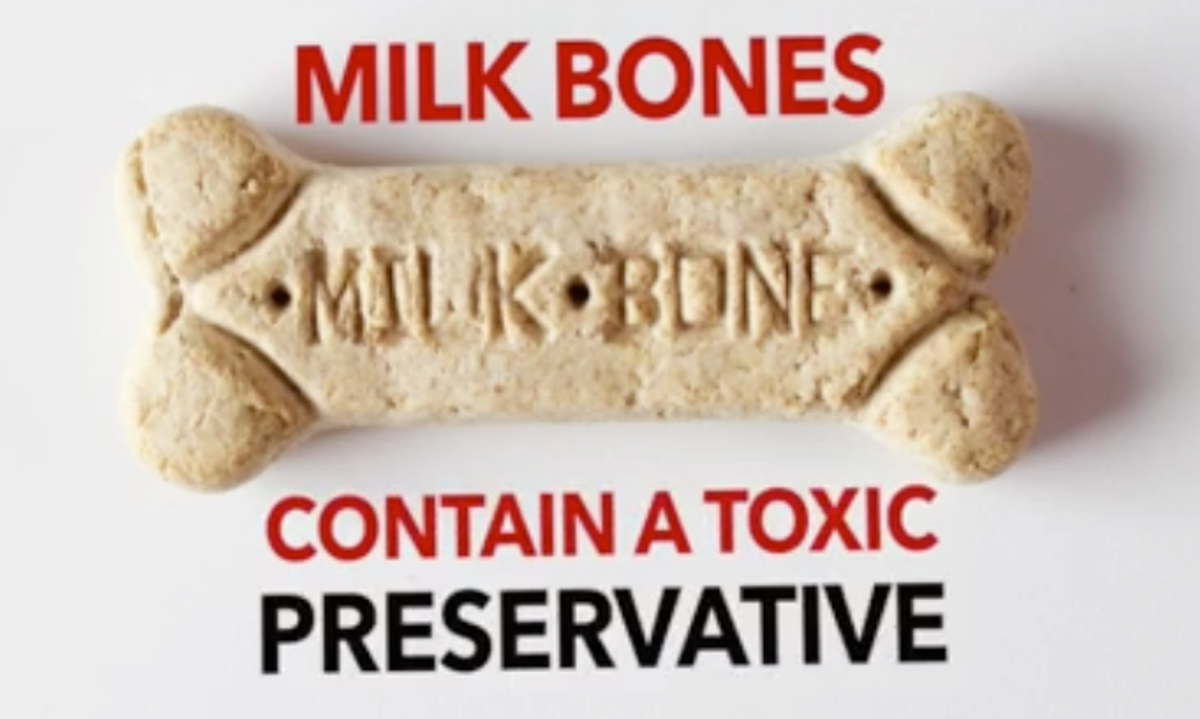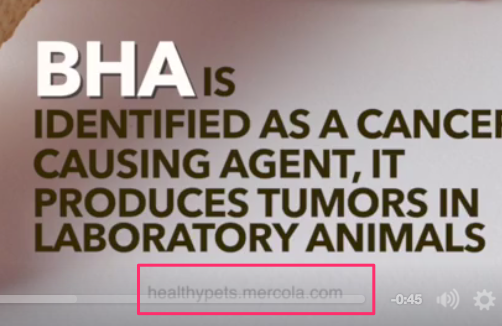Origin
On 22 March 2016, the Facebook page "Planet Paws" published a video claiming that Milk-Bone dog treats contained a known canine carcinogen, butylated hydroxyanisole (BHA):
Posted by Planet Paws on Tuesday, March 22, 2016
In just under one week, the video achieved nearly half a million shares and scores more views, causing worry to dog lovers across the social network. On an initial watch, we noticed a brief portion that cited the unreliable health site Mercola:
The viral Facebook video wasn't the first claim that BHA was a danger to dogs due to its purported carcinogenic effects. A blog about dogs featured several posts claiming that the National Institutes of Health had pegged BHA as a canine carcinogen, but only linked back to its own posts rather than any documentation from the NIH. We located a 1991 report [PDF] from the NIH on possible carcinogenic effects of BHA, but the most conclusive part simply stated:
The data available from epidemiological studies are inadequate to evaluate the relationship between human cancer and exposure specifically to BHA. Since BHA was listed in the Sixth Annual Report on Carcinogens, one epidemiological study of BHA has been identified. A population-based nested case-control study of stomach cancer in men and women within the Netherlands Cohort Study of dietary intake found no increase in risk at typical levels of dietary intake of BHA[.]
While "experimental animals" (presumably rats or mice) were mentioned, dogs did not appear in that NIH document. The Food and Drug Administration listed BHA as a "generally recognized as safe," or GRAS, additive; with respect to carcinogenic properties, the FDA said:
Data from several studies indicate that BHA is not a carcinogenic substance. There is evidence that BHA may interfere with synthesis of natural carcinogens and suppress or retard growth of tumors induced by known chemical carcinogens.
A 2000 study on BHA as a carcinogen published in the journal Food and Chemical Toxicology concluded:
The association between dietary intake of BHA and BHT and stomach cancer risk was investigated in the Netherlands Cohort Study (NLCS) that started in 1986 among 120,852 men and women aged 55 to 69 years ... After 6.3 years of follow-up, complete data on BHA and BHT intake of 192 incident stomach cancer cases and 2035 subcohort members were available for case-cohort analysis. Mean intake of BHA or BHT among subcohort members was 105 and 351 microg/day, respectively. For consumption of mayonnaise and other creamy salad dressings with BHA or BHT no association with stomach cancer risk was observed. A statistically non-significant decrease in stomach cancer risk was observed with increasing BHA and BHT intake [rate ratio (RR) highest/lowest intake of BHA = 0.57 (95% confidence interval (CI): 0.25-1.30] and BHT = 0.74 (95% CI: 0.38-1.43). In this study, no significant association with stomach cancer risk was found for usual intake of low levels of BHA and BHT.
We contacted Milk-Bone about the rumors, and the company responded:
Thank you for contacting us as we also would like to debunk the myth surrounding the video and BHA. We are a company of pet lovers, so we certainly take claims like this seriously. Let me assure you that all of the ingredients in our treats are completely safe for our consumer’s pets. As you’re likely aware, standards for pet food ingredient safety are set by the U.S. Food and Drug Administration and Association of American Feed Control Officials, and all of our ingredients meet or exceed these standards. We add a very small amount of BHA to our treats as an anti-oxidant that helps to preserve fats and protect against staleness. At these trace amounts, it is completely harmless. We hope this information helps put your reader’s minds at ease.
Dr. Jessica Vogelsang of Pawcurious told us:
Cancer is a complicated problem with multi-factorial origins, including a large heap of genetics and luck of the draw. While nutrition is important for health and all treats should be given in moderation, people shouldn't blame their pet's cancer on a Milk Bone they fed it in 2005. It's not health food, but it's not exactly a bucket of radioactive sludge either. The "experts" in these videos substitute Google searches and scary sound bites for actual science. They are much better videographers than scientists. In that vein they're most like the Food Babe of the pet world.
We were unable to substantiate claims that BHA, which is commonly used as a preservative in Milk-Bones (and many other dog treats), posed a risk to pets. Decades of research indicated that BHA was generally regarded as safe in both human and animal food products, and the only information cited by sites claiming otherwise was speculative and published in 1991. While data was insufficient to prove a link between BHA (a preservative) and cancer in dogs, it was worth bearing in mind that a lack of preservatives often posed a far greater immediate health risk due to potential growth of mold and bacteria.


